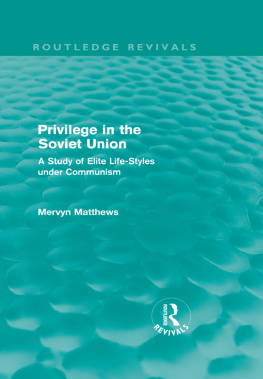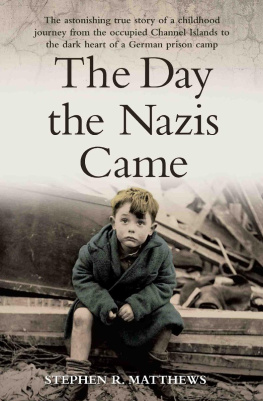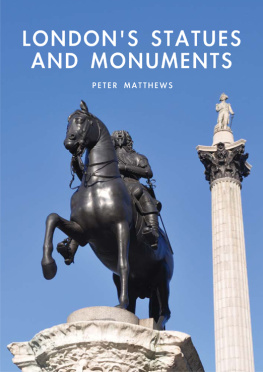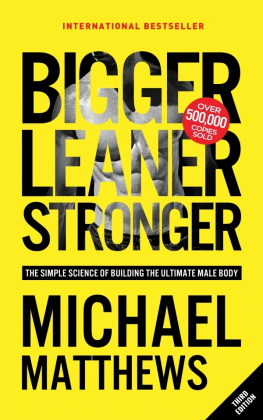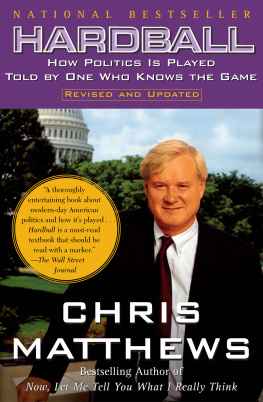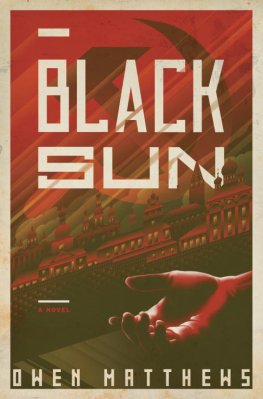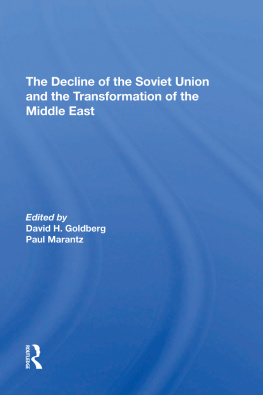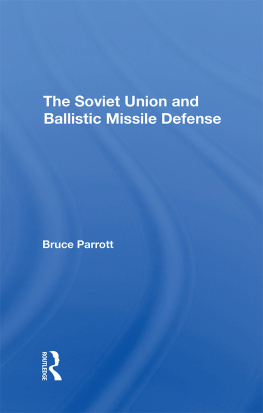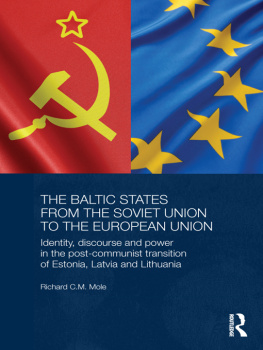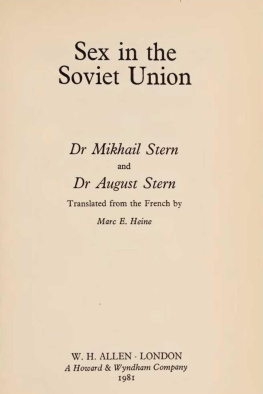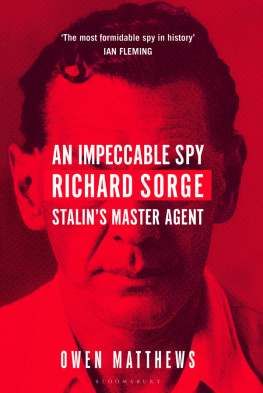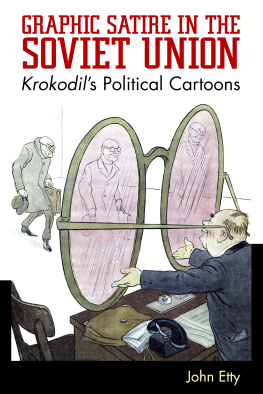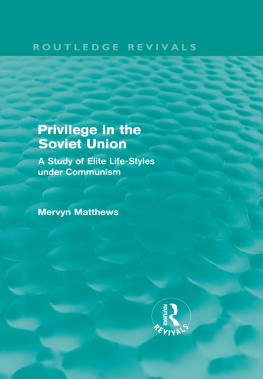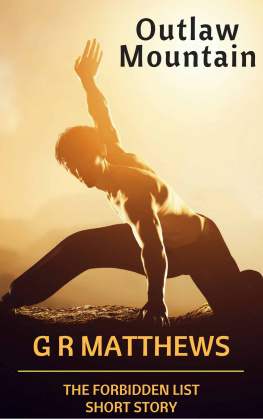Matthews - Privilege in the Soviet Union
Here you can read online Matthews - Privilege in the Soviet Union full text of the book (entire story) in english for free. Download pdf and epub, get meaning, cover and reviews about this ebook. publisher: Routledge, genre: Politics. Description of the work, (preface) as well as reviews are available. Best literature library LitArk.com created for fans of good reading and offers a wide selection of genres:
Romance novel
Science fiction
Adventure
Detective
Science
History
Home and family
Prose
Art
Politics
Computer
Non-fiction
Religion
Business
Children
Humor
Choose a favorite category and find really read worthwhile books. Enjoy immersion in the world of imagination, feel the emotions of the characters or learn something new for yourself, make an fascinating discovery.
Privilege in the Soviet Union: summary, description and annotation
We offer to read an annotation, description, summary or preface (depends on what the author of the book "Privilege in the Soviet Union" wrote himself). If you haven't found the necessary information about the book — write in the comments, we will try to find it.
Privilege in the Soviet Union — read online for free the complete book (whole text) full work
Below is the text of the book, divided by pages. System saving the place of the last page read, allows you to conveniently read the book "Privilege in the Soviet Union" online for free, without having to search again every time where you left off. Put a bookmark, and you can go to the page where you finished reading at any time.
Font size:
Interval:
Bookmark:
First published in 1978, this unique work throws much-needed light upon the exact nature of privilege and elite life-styles in the contemporary Soviet Union, under the Communist regime. Dr Matthews' study places these life-styles in a historical perspective, and characterises, in sociological terms, the people who enjoyed them.
This study is based on an extensive programme of personal interviews among emigr groups and a close analysis of original and little-known legal historical sources. There are special sections on the nature of change in the Soviet elite and on social mobility. This reissue will attract interest amongst students and scholars concerned with the history, politics and sociology of the Soviet Union; it will also be of value to all those concerned with the age-old problem of social equality.
A Study of Elite Life-Styles under Communism
Mervyn Matthews

First published in 1978
by George Allen & Unwin
This edition first published in 2011 by Routledge
2 Park Square, Milton Park, Abingdon, Oxon, OX 14 4RN
Simultaneously published in the USA and Canada
by Routledge
270 Madison Avenue, New York, NY 10016
Routledge is an imprint of the Taylor & Francis Group, an informa business
1978 Mervyn Matthews
All rights reserved. No part of this book may be reprinted or reproduced or utilised in any form or by any electronic, mechanical, or other means, now known or hereafter invented, including photocopying and recording, or in any information storage or retrieval system, without permission in writing from the publishers.
Publisher's Note
The publisher has gone to great lengths to ensure the quality of this reprint but points out that some imperfections in the original copies may be apparent.
Disclaimer
The publisher has made every effort to trace copyright holders and welcomes correspondence from those they have been unable to contact.
A Library of Congress record exists under ISBN: 0043230202
ISBN 13: 978-0-415-66964-1 (hbk)
ISBN 13: 978-0-203-81557-1 (ebk)
the Soviet Union
A Study of Elite Life-Styles
under Communism
MERVYN MATTHEWS
Reader in Soviet Studies, University of Surrey

First published in 1978
Second impression 1979
This book is copyright under the Berne Convention. All rights are reserved. Apart from any fair dealing for the purpose of private study, research, criticism or review, as permitted under the Copyright Act, 1956, no part of this publication may be reproduced, stored in a retrieval system, or transmitted, in any form or by any means, electronic, electrical, chemical, mechanical, optical, photocopying, recording or otherwise, without the prior permission of the copyright owner. Enquiries should be sent to the publishers at the undermentioned address:
GEORGE ALLEN & UNW1N LTD
40 Museum Street, London WC1A ILU
Mervyn Matthews, 1978
ISBN 0 04 323020 2
Printed and bound in Great Britain by
Billing & Sons Limited, Guildford, London, Oxford, Worcester
The idea of social privilege in communist societies may still be strange to a few people, but not many. The information which has accumulated in the West about inequality in Russia and East Europe is sufficient to dispel most illusions. An egalitarian ideology need not always mean egalitarianism in practice.
The main object of this book, then, is not to prove that privilege, political, economic or social, exists under communism. Obviously there must be differences, even under the most redistributive regime. I wish rather to define privileges of the communist variety a little more exactly than has hitherto been possible, and put them in some historical perspective. I have attempted to collect a body of fact about benefits, both material and moral, which are accessible only to small, restricted groups of people, and which are fixed by law or administrative practice. If public scrutiny of them were allowed, many of these benefits might be considered undeserved or excessive. The existence of privilege implies, of course, an elite to enjoy it. I have used my material to suggest answers to some of the questions sociologists might ask about the size and nature of such a group: this, indeed, forms a convenient starting point for this work. I have based this book on published documents and the testimonies of recent migrs whose powers of observation seemed eminently reliable. My approach is factual rather than attitudinal: I endeavour to show how privilege in Soviet and East European societies is actively promoted or administered for. The topic, like all sociological matters, is complex, so I have only attempted to cover some principal aspects. Each chapter concentrates on one of them, and is to some extent an independent study.
is concerned with defining an elite at the beginning of the seventies. I suggest income and occupation indices, bring in the problem of the official nomenclature lists, and propose a magnitude which could be useful for purposes of comparison with elites in other lands. In a sense, of course, this is an arbitrary exercise, for an elite can be large or small, open or closed, within quite wide conceptual limits. I hope, however, that my delineation is reasonably realistic. At least I have tried to avoid the vaporous generalisation which so often characterises discussions of Soviet society. And since I am dealing with only a small group at the top of the income scale, I have not thought it necessary to get involved in the argument about the overall distribution of Soviet incomes.
was first set out in a paper which I wrote for the NATO colloquium Economic Aspects of Life in the USSR, Brussels, January 1975 and was republished in Survey, Summer 1975 issue.)
The third and fourth chapters are concerned with the past, and their focus is primarily legal. My aim here is to see what social privileges were embodied in the earliest Soviet law, and how they developed over five and a half decades of Soviet rule. In other words, I explore the extent to which the framework of Soviet law was constructed, or modified, to benefit restricted social groups. I do not seek an explanation of existing privileges in the past, because the past cannot give one: an explanation is to be found, if anywhere, in the nature of society and man himself. Yet the legal developments of bygone days illustrate the extent to which the configuration of privilege is a matter of government decision, and deepen our comprehension of the present.
No social group can be thought of as a static entity. Unfortunately social mobility is very difficult to explore, especially in the Soviet context. But rather than leave an unacceptable gap, I have attempted to gather, in , information about change in the Soviet elite, and to draw a few modest conclusions from it. These generally point in the direction of stabilisation. Our understanding of a social group can sometimes be improved by comparison with like groups in other societies. Two interesting aspects of this problem form the subject of the last chapter. The first is elite life-styles in the Soviet-dominated countries of East Europe. I wish to see how far Soviet characteristics can be distinguished in them, and what differences protrude. Obviously it is impracticable to treat each of the six societies involved in detail, so I have limited myself to a few generalisations on them, followed by a more detailed discussion of Poland. A comparison of the Soviet elite and possible American counterparts takes up the last pages of the book.
Font size:
Interval:
Bookmark:
Similar books «Privilege in the Soviet Union»
Look at similar books to Privilege in the Soviet Union. We have selected literature similar in name and meaning in the hope of providing readers with more options to find new, interesting, not yet read works.
Discussion, reviews of the book Privilege in the Soviet Union and just readers' own opinions. Leave your comments, write what you think about the work, its meaning or the main characters. Specify what exactly you liked and what you didn't like, and why you think so.

